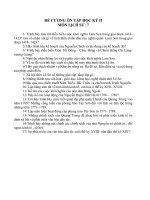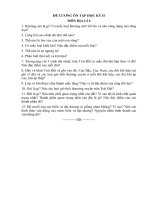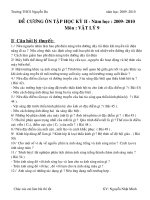ĐỀ CƯƠNG ÔN TẬP THI HỌC KỲ II
Bạn đang xem bản rút gọn của tài liệu. Xem và tải ngay bản đầy đủ của tài liệu tại đây (59.86 KB, 5 trang )
ẹE CệễNG ON TAP THI HOẽC KYỉ II- CHệễNg TRèNH 12
I. Vocabulary, Pronunciation : Unit 1- Unit 9
II. Grammar rules:
* Unit 1: (p. 10- p.15)
a. The infinitive: E.g: English is an important language to master.
=> English is an important language which we have to master.
b. Subject verb concord
- General rules: Singular Subject + Sing. Verb
Plural Subject+ Plu. Verb
- Special cases: bothand/with, along with/ eitheror,/ each, every/ a number of,the
number of,
c. Prefixes of degree or size: OUT- , SUPER-, SUR-, SUB-
* Unit 2: (p.22- p.30)
a. Styles: E.g: There is a determination to overcome problems.
=> Children determine to overcome proplems.
b. Expressions of quantity:
- Most/ most of; a great deal of/ a large number of;a lot of/ lots of; (too, very)many/ (too, very)
much
- Few/ a few; little/ a little E,g: She met a few friends/ There is a little sugar in the jar.
- How many/ how much
* Unit 4: (p. 53- p.62)
a. The use of the gerund (subject; object; complement)
b. Verbs+ gerund E.g: enjoy, avoid, its no use E.g: would you mind helping me a hand?
c. Verbs + To-inf E.g: decide, want, hope E.g: He hopes to pass the exams.
d. Verbs + Bare inf: E.g: make, let E.g: he made her cry
e. Verbs + Gerund/ to-inf E.g: try, remember
E.g: Remember to review the lessons carefully before the test./
I remember closing the door before going out.
* Unit 5: (p.66- p.76)
a. Prepositions following adjectives E.g: good at/ good for, important to
b. The suffix: Noun + LESS/ - FUL/ - LY/ - LIKE/- Y/ - ISH/ - AL => ADJ
e.g: childless, harmless/ bautiful/ yearly/ godlike/ rainy/ foolish/ industrial
* Unit 6: (p. 84- p. 97)
a. Relative clauses with WHO, WHOM, WHICH, WHERE, WHEN, WHY, WHOSE, THAT
b. Verb + Noun phrase + preposition E.g: catch sight of; keep pace with
* Unit 7: (p.99-p.110)
a. the use of be used to/ used to
b. British and American English E.g: movie- film/ sick- ill/
* Unit 8: (p. 114- p.122)
a. Acronyms E.g: WHO- World Health Organization,
b. Fractions E.g: ẵ: one- half,
c. Clause of purpose with SO THAT/ IN ORDER THAT
d. Phrase of purpose with TO/ IN ORDER TO/ SO AS TO
* Unit 9: (p. 127- p. 139)
a. Go + preposition E.g: go over/ go up
b. Sequence of tenses in adverbial clauses of time
-> Conjunctions: when, while, as soon as, as, no sonner..than,
-> The use of when, while…
c. Prefixes: UNDER-/ OVER- E.g: undersized/ oversized,…
* Comparison
a. equal: as + adj/ adv+ as E.g: He runs as fast as I do
b. Unequal : as/ so + adj/ adv+ as E.g: He doesn’t run as fast as I do
c. Comparatives: Adj/ Adv + ER+ Than E.g: I run faster than he does
More +Adj/ Adv +Than
d. Superlatives: THE+ Adj/ Adv + EST / E.g: I run the fastestin our class
THE + MOST + Adj/ Adv
* Special adjs/ adv E.g: good/well- better- the best,…
* So… that/ such…that/ enough/ too… to
a. So+ adj/ adv+ that/ such+ (a/ an)+ Adj + noun+ that: quá đến nỗi mà
b. enough+ noun + (for O) + to inf// adj/ adv + enough+ (for O) + to inf: đủ (cho ai) làm một việc gì đó
c. too + adj/ adv+(for O) + to inf: quá đến nỗi không thể
E.g: The weather is very cold. We can’t go out
-> the weather is so cold that we can’t go out/ -> It is such cold weather that we can’t go out
-> the weather is too cold for us to go out./ -> The weather isn’t warm enough for us to go out.
* If clauses
Type 1: Có thể xảy ra ở hiện tại hoặc tương lai
IF + hiện tại , tương lai (will + Vinf) e.g: If you study hard, you will pass the exmas easily.
Type 2: không có thật ở quá khứ
IF + V2/ Ved , Would/ could + Vinf E.g: If I were you, I would try my best.
(be-> WERE)
Type 3: không thật ở quá khứ
IF + quá khứ hoàn thành ( Had + P.P) , Would/ could have + P.P
E.g: If he had studied hard, he wouldn’t have failed the exams.
* Không thật lui một thì .
*Tenses:(active and passive)
a. simple present:
Active: S+ Be (am/ is/ are)/ V/ Vs,esE.g: I play tennis.
Passive: S+ am/ is/ are + P.P E.g: Tennis is played.
b. present countinuous
Active: S+ am/ is/ are + Ving E.g: Mary is watching TV now.
Passive: S+ am/ is/ are +being+ P.P E.g: TV is being watched by Mary.
c. simple past
Active: S+ Be (was/ were)/ Ved/ V2 E.g: I played tennis.
Passive: S+ was/ were + P.P E.g: Tennis was played.
d. past continuous
Active: S+ Was/ Were+ VingE.g: He was washing clothes at this time yesterday.
Passive: S+ was/were+being + P.P E.g: Clothes were being washed at this time yesterday.
e. present perfect:
Active: S+ have/has+ P.P E.g: They have built a new school for 2 months.
Passive: S+ have/ has+ been+P.P E.g: A new school has been built for 2 months.
f. past perfect:
Active: S+ had + P.P E.g: I had played tennis before you came .
Passive: S+ had+been + P.P E.g: Tennis had been played before you came.
g. simple future:
Active: S+ will/shall+Vinf E.g: I will borrow some books from the library.
Passive: S+ will/shall+be + P.P E.g: Some books will be borrowed from the library.
h. Modal verbs ( can, will, may, could, would, be going to, should, have to, must…)
Active: S+ modal.V +Vinf E.g: I have to learn the lesson carefully.
Passive: S+ modal.V+be + P.P E.g: The lesson have to be learned carefully.
i. future continuous: will + be+ Ving
j. Future perfect: will have+ P.P
k. present perfect continuous: have/ has+ been + ving
* Reported speech
- Statement: (câu trần thuật) S1 + said/ told+ That+ S2 + V (lui thì)
- Imperatives (câu mệnh lệnh) – Khẳng đònh: S+ told/ ordered…+ O+ to inf/
- Phủ đònh: S+ told/ ordered…+ O+ not to inf
- Questions (câu hỏi)
+ Yes/ No questions: S1+ asked/ wanted to know…+ (O) + IF/ Whether + S2+ V (lui thì)
+ Wh- questions: S1+ asked/ wanted to know…+ (O) + Wh-word + S2+ V (lui thì)
- Changes of :tenses/ adverbs of time/ places/ pronouns
EXCERCISES
I. Multiple choice
1. There is not _________ in the bag. ( some/ any/ anything/ something)
2. Where is the T- shirt_________ she gave you on your birthday? ( which/ who/ whom/ of which)
3. My class is _________the second floor. ( in/ on/ at/ from)
4. _________days are there in a week? ( how much/ how far/ how many/ how long)
5. A new building _________built near my school next June. ( would be/ can be/ shall be/ will be)
6. How _________is the dictionary? ( many/ much/ money/ far)
7. What’s the weather _________in winter in London? ( has/ is/ do/ like)
8. His opinion differs _________ mine. ( to/ in/ from/ with)
9. John often goes to bed early and _________ up late. (gets/ get/ getting/ got)
10. After lunch he usually takes _______ short rest. (a/ an/ the/ zero)
11. “Hello. My name is Phuong. Nice to meet you”
- “Hello!________.” (That’s fine/ Good/ Really? / I’m Susan. Pleased to meet you)
12. It would be hard to name areas________ computers are not being used. ( where/ how/ what/ when)
13. My chidren got_______ when I told them about the trip to Halong Bay (exciting/ excited/ excitingly/
excitement)
14. In my life, I have ______ seen such a beautiful sunset. ( no/ none/ never/ ever)
15. You should start it right now, ______ it will be too late. ( if/ in case/ but/ or)
16. mathematics _______not an easy subject for everybody. ( will be/ are/ is/ aren’t)
17. She looked ______when she heard the terrifying noise. (frightfully/ frightened/ fright/ frightening)
18. How ______ do you go to the cinema? (many times/ quite often/ often/ much)
19. Jane visited her parents only once a year. In other words, she ____visits them. ( usually/ often/
always/ rarely)
20. This church ______ by the famous architect. David Brown. ( designed/ was designed/ had designed/
was designing)
21. When are you leaving _____ Hai phong? ( toward/ forward/ for/ to)
22. When I phoned the headmaster, his secretary _______me to hold on for a moment. ( tells/ was telling/
told/ would tell)
23. Mrs. Jeremy lives _____ to my house. ( by/ in/ next/ over)
24. While I _____ this morning, I lost my purse. ( shop/ was shopping/ shopping/ am shopping)
25. This shirt is _____for me to wear. ( so/ quite/ too/ very)
26. “ Where are we going to meet?”- ____ the square?” ( How about/ How is about/ What is about/ What
about is)
27. The little girl wouldn’t go to the beach ______ her father went to. ( but/ also/ unless/ except)
28. Every Sunday, bob is with his father____him with his carpentry work. ( has helped/ helps/
helped/helping)
29. I haven’t seen him_____. ( many years ago/ for many years/ since many years)
30. The government is doing a lot to help_______. ( poor/ the poor ones/ the poors/ the poor)
31. They work at this school, but this week, they _____at Loc An school. (work/ are working/ worked/
have worked)
32. “ How wide is this street?” - _It’s_______” ( thirteen yards wide/ thirteen yards in wide/ wide thirteen
yards/ in wide thirteen yards )
33. When he left school, John decided to join the army ______a university. ( of instead going to/ of goint
to instead/ going to instead of/ instead of going to)
34. Take this road and______arrive at the hotel in 5 minutes. ( after you will/ then you will/ will then you/
will so you)
35. Yellowstone National Park is not ______in the USA. ( largest park/ the largest park/ a larger park/
one largest park)
36. I’ve lost my watch. _______watch was given to me on my 21
st
birthday. (A/ An/ The/ It)
37. Sport, in general, is very popular in Britain, Australia and America; _______country has its own
particular sports. (another/ each of/ all/ each)
38. If I learn harder, I ________ pass the final exams. (should/ will/ could/ would)
39. John swims very well and _________ does his brother.
40. She remembered the correct address only ________ she had posted the letter. ( since/ afterwards/
following/ after)
41. I like Robinson Crusoe. He is the main character in a book by Daniel Defoe.
A. I like R.C, who is the main chacracterin a book by Daniel Defoe.









